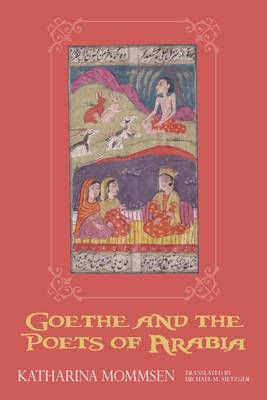
- Retrait gratuit dans votre magasin Club
- 7.000.000 titres dans notre catalogue
- Payer en toute sécurité
- Toujours un magasin près de chez vous
- Retrait gratuit dans votre magasin Club
- 7.000.0000 titres dans notre catalogue
- Payer en toute sécurité
- Toujours un magasin près de chez vous
Description
A comprehensive account of Goethe's relationship to Arabian culture, mediated by his interest in certain poets and texts and by his highly nuanced attitude toward Islam. Abundant evidence bears witness to Johann Wolfgang Goethe's lifelong predilection for the literature, religion, and culture of ancient Arabia. Scholars have hardly yet touched upon Goethe's relationship to Arabic literature. His remarkable West-östlicher Divan suggested that his interest in the "Orient" was limited to the Persian poet Hafez, his chief model for the collection, and to the culture of Persia. Yet significant aspects of this work and others stem from pre-Islamic and Islamic traditions of Arabian literature.
This study examines comprehensively Goethe's relationship to Arabian culture, mediated primarily by his interest in certain poets and texts and by his highly nuanced attitude toward Muhammad, the Qur'an, and Islam. Katharina Mommsen has explored exhaustively Goethe's opinions about Arab poets and their sources, the numerous traces of Arabic poetry that entered his works, and thegrounds for his ambivalent affinity for Islam and its Prophet. Extensive textual evidence reveals how throughout his life Goethe's temperament determined his interest in particular Arabian poets and was in turn modulated by them.The study also opens new perspectives on Goethe's biography, especially in the early nineteenth century when he was writing the Divan. Katharina Mommsen's studies of Goethe, including Goethe und die Moallakat, Goethe und 1001 Nacht, and numerous articles on Goethe and Islam, are recognized internationally. She is Professor Emerita of German at Stanford University. Michael M. Metzger is Professor Emeritus of German at the University at Buffalo.
This study examines comprehensively Goethe's relationship to Arabian culture, mediated primarily by his interest in certain poets and texts and by his highly nuanced attitude toward Muhammad, the Qur'an, and Islam. Katharina Mommsen has explored exhaustively Goethe's opinions about Arab poets and their sources, the numerous traces of Arabic poetry that entered his works, and thegrounds for his ambivalent affinity for Islam and its Prophet. Extensive textual evidence reveals how throughout his life Goethe's temperament determined his interest in particular Arabian poets and was in turn modulated by them.The study also opens new perspectives on Goethe's biography, especially in the early nineteenth century when he was writing the Divan. Katharina Mommsen's studies of Goethe, including Goethe und die Moallakat, Goethe und 1001 Nacht, and numerous articles on Goethe and Islam, are recognized internationally. She is Professor Emerita of German at Stanford University. Michael M. Metzger is Professor Emeritus of German at the University at Buffalo.
Spécifications
Parties prenantes
- Auteur(s) :
- Editeur:
Contenu
- Nombre de pages :
- 508
- Langue:
- Anglais
- Collection :
- Tome:
- n° 152
Caractéristiques
- EAN:
- 9781571139085
- Date de parution :
- 01-08-14
- Format:
- Livre relié
- Format numérique:
- Genaaid
- Dimensions :
- 152 mm x 229 mm
- Poids :
- 843 g

Les avis
Nous publions uniquement les avis qui respectent les conditions requises. Consultez nos conditions pour les avis.






